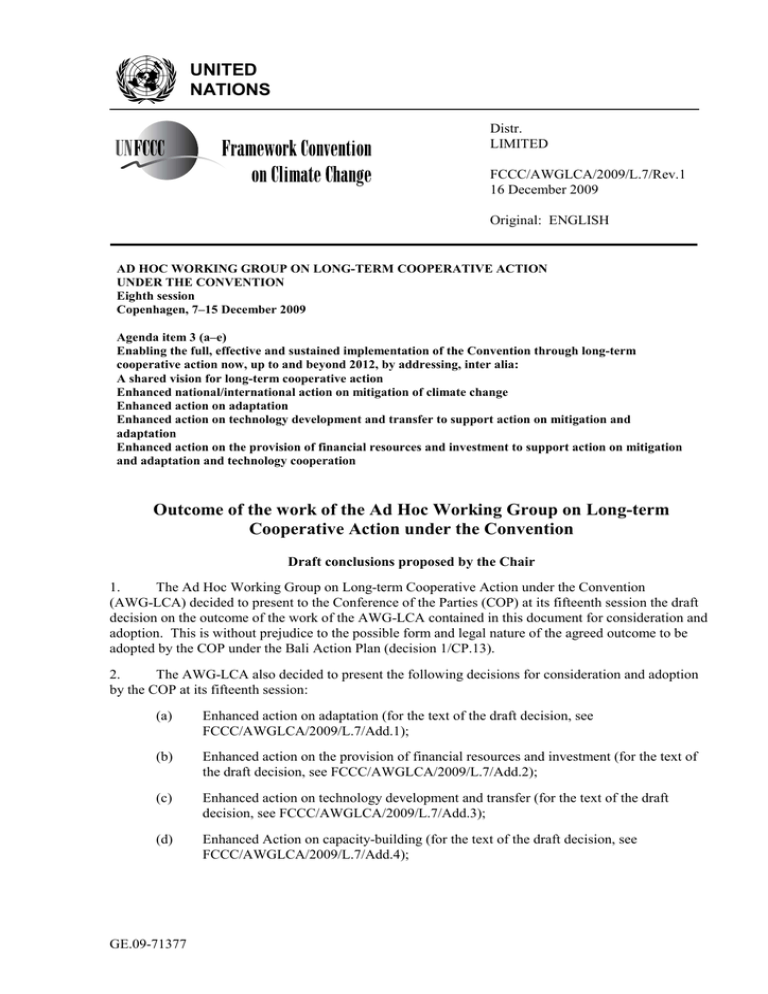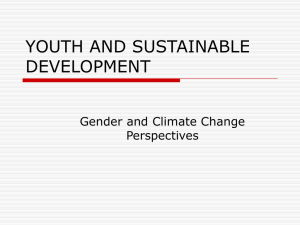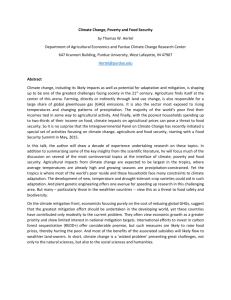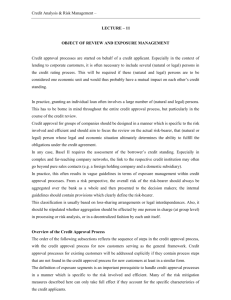UNITED NATIONS Distr.
advertisement

UNITED NATIONS Distr. LIMITED FCCC/AWGLCA/2009/L.7/Rev.1 16 December 2009 Original: ENGLISH AD HOC WORKING GROUP ON LONG-TERM COOPERATIVE ACTION UNDER THE CONVENTION Eighth session Copenhagen, 7–15 December 2009 Agenda item 3 (a–e) Enabling the full, effective and sustained implementation of the Convention through long-term cooperative action now, up to and beyond 2012, by addressing, inter alia: A shared vision for long-term cooperative action Enhanced national/international action on mitigation of climate change Enhanced action on adaptation Enhanced action on technology development and transfer to support action on mitigation and adaptation Enhanced action on the provision of financial resources and investment to support action on mitigation and adaptation and technology cooperation Outcome of the work of the Ad Hoc Working Group on Long-term Cooperative Action under the Convention Draft conclusions proposed by the Chair 1. The Ad Hoc Working Group on Long-term Cooperative Action under the Convention (AWG-LCA) decided to present to the Conference of the Parties (COP) at its fifteenth session the draft decision on the outcome of the work of the AWG-LCA contained in this document for consideration and adoption. This is without prejudice to the possible form and legal nature of the agreed outcome to be adopted by the COP under the Bali Action Plan (decision 1/CP.13). 2. The AWG-LCA also decided to present the following decisions for consideration and adoption by the COP at its fifteenth session: (a) Enhanced action on adaptation (for the text of the draft decision, see FCCC/AWGLCA/2009/L.7/Add.1); (b) Enhanced action on the provision of financial resources and investment (for the text of the draft decision, see FCCC/AWGLCA/2009/L.7/Add.2); (c) Enhanced action on technology development and transfer (for the text of the draft decision, see FCCC/AWGLCA/2009/L.7/Add.3); (d) Enhanced Action on capacity-building (for the text of the draft decision, see FCCC/AWGLCA/2009/L.7/Add.4); GE.09-71377 FCCC/AWGLCA/2009/L.7/Rev.1 Page 2 (e) Nationally appropriate mitigation actions by developing country Parties: mechanism to record nationally appropriate mitigation actions and facilitate provision and recording of support (for the text of the draft decision, see FCCC/AWGLCA/2009/L.7/Add.5); (f) Policy approaches and positive incentives on issues relating to reducing emissions from deforestation and forest degradation in developing countries (for the text of the draft decision, see FCCC/AWGLCA/2009/L.7/Add.6); (g) Enhanced national/international action on mitigation of climate change: economic and social consequences of response measures (for the text of the draft decision, see FCCC/AWGLCA/2009/L.7/Add.7); (h) Various approaches, including opportunities for using markets, to enhance the costeffectiveness of, and to promote, mitigation actions (for the text of the draft decision, see FCCC/AWGLCA/2009/L.7/Add.8); (i) Cooperative sectoral approaches and sector-specific actions in agriculture (for the text of the draft decision, see FCCC/AWGLCA/2009/L.7/Add.9). Draft decision -/CP.15 [The Conference of the Parties, Pursuant to the Bali Action Plan (decision 1/CP.13), and recognizing the need for long-term cooperative action to enable the full, effective and sustained implementation of the Convention now, up to and beyond 2012, Guided by the ultimate objective of the Convention, as stated in Article 2, Recalling the principles, provisions and commitments set forth in the Convention, in particular the provisions of Articles 3 and 4, Also recalling the special national circumstances of Parties undergoing the process of transition to a market economy, as stated in Article 4, paragraph 6, of the Convention and relevant decisions by the Conference of the Parties, and of Parties whose special circumstances are recognized by decisions of the Conference of the Parties, such as decision 26/CP.7, Acknowledging the important and ongoing role of the Kyoto Protocol in contributing to the ultimate objective of the Convention, Having considered the work of the Ad Hoc Working Group on Long-term Cooperative Action under the Convention pursuant to paragraph 2 of decision 1/CP.13, Reaffirming the political commitment and renewing the global partnership to combat climate change and to address existing deficiencies in the implementation of the Convention, Noting resolution 10/4 of the United Nations Human Rights Council on human rights and climate change, which recognizes that human beings are at the centre of concerns for sustainable development, and the importance of respecting Mother Earth, its ecosystems and all its natural beings, Mindful that the adverse effects of climate change have a range of direct and indirect implications for the full enjoyment of human rights, including living well, and that the effects of climate FCCC/AWGLCA/2009/L.7/Rev.1 Page 3 change will be felt most acutely by those parts of the population that are already vulnerable owing to youth, gender, age or disability, Recognizing the right of all nations to survival and that sustainable development and poverty eradication are the first and overriding priorities of developing country Parties, Also recognizing the important role of food production systems in mitigation and adaptation efforts, Further recognizing that a broad range of stakeholders needs to be engaged on global, regional, national and local levels, be they governmental, including subnational and local government, private business or civil society, including the youth and persons with disability, and that gender equality and the effective participation of women and indigenous peoples are important for effective action on all aspects of climate change, Deeply concerned about the findings of the Fourth Assessment Report of the Intergovernmental Panel on Climate Change that the climate system is warming as a consequence of human activity, Recognizing that adverse effects are already evident and widespread, particularly in vulnerable regions of the world, and that a delay in prompt and sufficient global emission reductions will lead to significant additional cost for both mitigation and adaptation, constrain opportunities to achieve lower stabilization levels and increase the risk of large-scale, abrupt and irreversible impacts and breaches of critical climate thresholds, Affirming therefore the need for deep cuts in global greenhouse gas emissions and early and urgent undertakings to accelerate and enhance the implementation of the Convention by all Parties, on the basis of equity and in accordance with their common but differentiated responsibilities and respective capabilities, Acknowledging that the largest share of historical and current global emissions of greenhouse gases has originated in developed countries and that owing to this historical responsibility, developed country Parties must take the lead in combating climate change and the adverse effects thereof [by adopting ambitious, quantified, legally-binding, economy-wide domestic emission reduction commitments or actions, and by providing adequate financial, technological and capacity-building support to developing country Parties], Confirming that policies and measures to respond to climate change shall be implemented in such a way as to minimize adverse effects on other Parties, especially developing country Parties, Acknowledging further that developing country Parties are already contributing and will continue to contribute to a global mitigation effort in accordance with the provisions of the Convention and could enhance their mitigation actions depending on the provision of means of implementation by developed country Parties, Realizing that addressing climate change requires a paradigm shift towards building a lowemission society that offers substantial opportunities and ensures continued high growth and sustainable development, based on innovative technologies and more sustainable production and consumption, while ensuring a just transition of the workforce that creates decent work and quality jobs, FCCC/AWGLCA/2009/L.7/Rev.1 Page 4 A shared vision for long-term cooperative action1 Agrees that 1. The shared vision for long-term cooperative action, including a long-term global goal for emission reductions, shall guide and enhance the full, effective and sustained implementation of the Convention in order to achieve its objective as set out in its Article 2. It integrates the building blocks of the Bali Action Plan and addresses mitigation, adaptation, technology development and transfer, financing and capacity-building in a balanced and comprehensive manner; in particular, it gives equal weight to action on adaptation and mitigation. 2. A long-term aspirational and ambitious global goal for emission reductions, as part of the shared vision for long-term cooperative action, should be based on the best available scientific knowledge and supported by medium-term goals for emission reductions, taking into account historical responsibilities and an equitable share in the atmospheric space; Accordingly: (a) Parties shall cooperate to avoid dangerous climate change, in keeping with the ultimate objective of the Convention, recognizing [the broad scientific view] that the increase in global average temperature above pre-industrial levels [ought not to] exceed [2 oC][1.5 oC][1oC] [preceded by a paradigm for equal access to global atmospheric resources]; (b) [Parties should collectively reduce global emissions by at least [50] [85] [95] per cent from 1990 levels by 2050 and should ensure that global emissions continue to decline thereafter;] (c) [Developed country Parties as a group should reduce their greenhouse gas emissions by [[75–85] [at least 80–95] [more than 95] per cent from 1990 levels by 2050] [more than 100 per cent from 1990 levels by 2040];] 3. [Parties should cooperate in achieving the peaking of global and national emissions [as soon as possible][in 2015], recognizing that the time frame for peaking will be longer in developing country Parties and bearing in mind that social and economic development and poverty eradication are the first and overriding priorities of developing country Parties and that low-emission development is indispensable to sustainable development;] 4. [To be elaborated: a long-term goal for financing;] 5. [To be elaborated: provision on trade measures (reference to Art. 3, paragraph 5 of the Convention);] 6. [Consistent with the provisions of the Convention, the Conference of the Parties shall periodically review the overall progress towards the achievement of the ultimate objective of the Convention, and the adequacy of the long-term global goal for emission reductions and the commitments and actions on mitigation, adaptation, finance, technology development and transfer and capacitybuilding. The review should take into account: (a) 1 The best available scientific knowledge, including the assessment reports of the IPCC, as well as relevant technical, social and economic information; Titles are included solely to assist the reader. FCCC/AWGLCA/2009/L.7/Rev.1 Page 5 (b) Observed impacts of climate change, especially impacts on particularly vulnerable developing countries; (c) The need to prevent and minimize negative impacts of climate change and response measures; (d) An assessment of the overall aggregated effect of the steps taken by the Parties in order to achieve the ultimate objective of the Convention and the shared vision.] 7. Based on the review, the Conference of the Parties shall take appropriate action. 8. [Further modalities of this review shall be determined by the Conference of the Parties. The first review shall start no later than 2014 and to be concluded no later than 2016. Subsequent reviews shall be conducted every four years.] Enhanced action on adaptation and its associated means of implementation Agrees that 9. Adaptation to the adverse effects of climate change [and/or to the impact of the implementation of response measures] is a challenge faced by all Parties, and that enhanced action and international cooperation on adaptation is urgently required to enable and support the implementation of adaptation actions aimed at reducing vulnerability and building resilience in developing country Parties, especially in those that are particularly vulnerable[, especially the least developed countries, small island developing States and countries in Africa affected by drought, desertification and floods]. Decides 10. To establish, pursuant to decision -/CP.15 (Enhanced action on adaptation): (a) The Copenhagen Adaptation [Framework] [Programme]; (b) [An] [A] [Adaptation Committee] [Subsidiary Body on Adaptation] [Advisory Body on Adaptation]; (c) [An International Mechanism to address loss and damage]; (d) [Arrangements for reporting and assessment;] (e) [An international adaptation centre and regional centres;] (f) [A process for least developed country Parties is to be established to formulate and implement national adaptation plans that build upon the experience of the national adaptation programmes of action as a means of identifying medium- and long-term adaptation needs and developing strategies and programmes to address those needs]. Agrees that 11. Developed country Parties shall provide adequate, predictable and sustainable financial resources, technology and capacity-building to support the implementation of adaptation action in developing country Parties. FCCC/AWGLCA/2009/L.7/Rev.1 Page 6 Enhanced action on mitigation and its associated means of implementation Nationally appropriate mitigation commitments or actions by developed country Parties [Agrees that 12. Developed country Parties shall undertake, individually or jointly, legally binding nationally appropriate mitigation commitments or actions, [including][expressed as] quantified economywide emission reduction objectives with a view to reducing the collective greenhouse gas emissions of developed country Parties by [at least [25–40] [in the order of 30] [40] [45] [49]] [x∗] per cent from [1990] [or 2005] levels by [2017][2020]; 13. Developed country Parties shall prepare low-emission plans for long-term emission reductions so as to contribute to the achievement of the objective set out in paragraph 2 above; 14. The efforts of developed country Parties to reduce their greenhouse gas emissions shall be comparable in [legal form, magnitude of] effort [and provisions for measuring, reporting and verification, and shall take into account their national circumstances and historical responsibilities]; 15. Developed country Parties’ quantified economy-wide emission reduction objectives shall be formulated as a percentage reduction in greenhouse gas emissions [for the period] [from 2013 to 2020] compared to 1990 or another base year [adopted under the Convention]; 16. [For those Annex I Parties that are Parties to the Kyoto Protocol, the quantified economy-wide emission reduction objectives shall be those adopted for the second commitment period under the Kyoto Protocol inscribed in Annex B of the Kyoto Protocol as amended and also listed in appendix I to this decision; for other Annex I Parties, the agreed quantified emission reduction objectives shall be those listed in appendix I to this decision]; Agrees that 17. [Developed country Parties shall achieve their quantified economy-wide emission reduction objectives [primarily] through domestic efforts;] 18. [The role of land use, land-use change and forestry in meeting quantified economy-wide emission reduction objectives shall be in accordance with guidelines to be adopted by the Conference of the Parties;] 19. Nationally appropriate mitigation commitments or actions by developed country Parties shall be measured, reported and verified in accordance with existing and any further guidelines adopted by the Conference of Parties[, taking into account the relevant provisions under the Kyoto Protocol]; 20. [Principles, modalities, rules and guidelines to promote compliance with commitments by developed country Parties shall be developed];] Nationally appropriate mitigation actions by developing country Parties [Option 1: Agrees that ∗ X is equal to the sum of reductions by Parties. FCCC/AWGLCA/2009/L.7/Rev.1 Page 7 [Developing country Parties shall [under]take nationally appropriate mitigation actions, 21. enabled and supported by finance, technology and capacity-building and [may undertake] autonomous mitigation actions, together aimed at achieving a substantial deviation in emissions [in the order of 15–30 per cent by 2020] relative to those emissions that would occur in the absence of enhanced mitigation, and prepare low-emission development plans, recognizing that the extent of enhanced mitigation by these countries depends on the level of available support; Takes note of 22. Information on enhanced mitigation actions by developing country Parties, as contained in appendix II to this decision; Decides 23. To establish a mechanism pursuant to decision -/CP.15 ([Mechanism to Record Mitigation Actions and Facilitate Matching of Support]): (a) To record nationally appropriate mitigation actions, supported and enabled by finance and technology, [and autonomous mitigation actions][in a registry][in a national schedule]; (b) To facilitate the matching of support provided through the financial mechanism and from bilateral and multilateral sources with nationally appropriate mitigation actions for which support is sought; Agrees that 24. National communications, including greenhouse gas inventories, shall be prepared by developing country Parties and submitted to the Conference of the Parties every [X] years, with flexibility for the least developed countries and small island developing States, in accordance with revised guidelines to be adopted by the Conference of the Parties; 25. Information on [planned and implemented] mitigation actions of developing country Parties shall be provided through national communications and shall be [assessed at the national level] [considered in a [review][consultative] process under the Convention], in accordance with guidelines to be adopted by the Conference of the Parties;] 26. Nationally appropriate mitigation actions supported by finance, technology and capacitybuilding, shall be subject to measurement, reporting and verification in accordance with guidelines to be adopted by the Conference of the Parties; 27. Developing country Parties should, in accordance with the provisions contained in decision -/CP.15 (REDD-plus2), contribute to mitigation actions in the forest sector by undertaking the following activities: 2 (a) Reducing emissions from deforestation; (b) Reducing emissions from forest degradation; (c) Conservation of forest carbon stocks; In this text, “REDD-plus” refers to “policy approaches and positive incentives on issues relating to reducing emissions from deforestation and forest degradation in developing countries; and the role of conservation, sustainable management of forests and enhancement of forest carbon stocks in developing countries”. FCCC/AWGLCA/2009/L.7/Rev.1 Page 8 (d) Sustainable management of forest; (e) Enhancement of forest carbon stocks; 28. Enabling activities carried out by developing country Parties, such as preparation and elaboration of low-emission development plans, preparation of national communications and greenhouse gas inventories, and planning and elaboration of nationally appropriate mitigation actions, and related capacity-building, shall be supported on the basis of the agreed full costs; 29. Developed country Parties shall provide new and additional financial resources, technology and institutional capacity-building support for nationally appropriate mitigation actions on the basis of agreed full incremental costs, in accordance with Article 4, paragraphs 3, 5 and 7, and Article 11, paragraph 5, of the Convention;] [Option 2: Alternatives suggested by Parties] Other aspects of mitigation Decides 30. To [establish] [provide for] a forum to consider actions to address the impact of the implementation of response measures on Parties referred to in Article 4, paragraphs 8, of the Convention, in accordance with guidance to be agreed by the Conference of the Parties, pursuant to decision -/CP.15 (Response measures); 31. To pursue various approaches, including opportunities to use markets, to enhance the cost-effectiveness of, and to promote, mitigation actions, in accordance with decision -/CP.15 (Various Approaches); Agrees that 32. [To be elaborated: policy approaches and measures to limit and reduce greenhouse gas emissions from aviation and marine bunker fuels]; 33. Parties should undertake sectoral approaches and sector-specific actions to enhance the implementation of Article 4, paragraph 1 (c), in agriculture pursuant to decision -/CP.15 (Agriculture); Enhanced action on the provision of financial resources and investment Agrees that 34. The financial mechanism under Article 11 of the Convention shall be further operationalized to ensure full and effective implementation of the Convention, in particular commitments contained in Article 4, paragraphs 3, 4, 5, 8 and 9, and in the context of Article 4, paragraph 7; 35. Scaled up, new and additional, predictable and adequate funding shall be provided to developing country Parties, in accordance with Article 4, paragraphs 3, 4, 5, 8 and 9, of the Convention, to enable and support enhanced action on mitigation, including REDD-plus, adaptation, technology development and transfer and capacity-building, for enhanced implementation of the Convention [after 2012]; FCCC/AWGLCA/2009/L.7/Rev.1 Page 9 36. The main source of funding through the financial mechanism shall be new and additional financial resources provided by developed country Parties; 37. Private-sector financing and other innovative sources of funding shall supplement the provision of public financial resources; 38. [Developed country Parties][All Parties, except least developed countries,] shall [, beginning in 2013,] provide resources based on an [assessed][indicative] scale of contributions] to be adopted by the Conference of the Parties]; 38 bis. [The Conference of the Parties shall adopt provisions and arrangements for how international auctioning and cap-and-trade systems could be an international source of funding for climate change actions in developing countries;] 38 ter. [For mitigation purposes the funds shall develop different incentive mechanisms to encourage ambitious actions in all developing countries according to their own priorities and circumstances; funding should primarily be delivered through results-based mechanisms;] Decides 39. A [Finance Board] of the financial mechanism shall be established under the guidance of and be accountable to the Conference of the Parties to undertake [overview][oversight], facilitative and verification functions, pursuant to decision -/CP.15 (Finance); 40. That a Climate [Facility][Fund] [shall be][is] established as an operating entity of the financial mechanism of the Convention to support projects, programmes, policies and other activities related to mitigation, including REDD-plus, adaptation, capacity-building, technology development and transfer; Agrees that 41. The Conference of the Parties shall adopt provisions to measure, report and verify the support provided for enhanced action by developing country Parties; Takes note of 42. [Individual pledges by developed country Parties to provide new and additional resources amounting to [XX] for the period 2010 - 2012, as contained in appendix III, to enable and support enhanced action on mitigation, including REDD-plus, adaptation, technology development and transfer, and capacity building, in developing country Parties;] Enhanced action on development and transfer of technology Decides 43. To establish a Technology Mechanism pursuant to decision -/CP.15 (Technology) to accelerate technology development and transfer in support of action on adaptation and mitigation that will be guided by a country-driven approach and be based on national circumstances and priorities, consisting of: (a) A Technology Executive Committee in accordance with terms of reference to be adopted by the Conference of the Parties; FCCC/AWGLCA/2009/L.7/Rev.1 Page 10 (b) A Climate Technology Centre and Network to support and accelerate the diffusion of environmentally sound technologies for mitigation and adaptation to developing country Parties through the provision of technical assistance and training; Enhanced action on capacity-building Agrees that 44. Financial support shall be provided for capacity-building actions pursuant to decision -/CP.15 (Capacity-building); Arrangements and timelines for further work 45. [To be elaborated: Arrangements and timelines for further work to give effect to the provisions of this draft text.] [Appendices [to be elaborated] I. Nationally appropriate mitigation commitments or actions by developed country Parties II. Nationally appropriate mitigation actions by developing country Parties III. Pledges by developed country Parties to provide new and additional financial resources for the period 2010–2012]] -----



